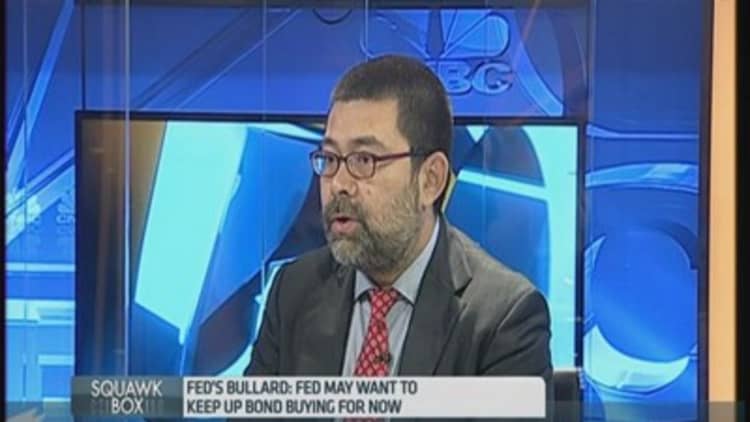
Suggestions quantitative easing (QE) might go on a reunion tour in the U.S. helped to staunch market losses Thursday, but don't hold your breath waiting for the Federal Reserve to whip out the checkbook, analysts said.
"It's part of a strategy to calm markets down, to remind them that 'we still have your back and we're on top of this' from a central bank point of view," Mikio Kumada, global strategist at LGT Capital Partners, told CNBC. "Whether they will actually do it, I'm not so sure. At least as far as the U.S. is concerned, the economic conditions are decent enough."
Read More Markets back to hanging on the Fed's every word
Stocks bounced back Thursday after a rough opening, with the S&P 500 ending the day less than a point higher, after St. Louis Federal Reserve President James Bullard Thursday morning suggested to Bloomberg TV, that the Fed should consider pausing its taper of the quantitative easing program.
"We have to make sure that inflation expectations remain near our target. And for that reason, I think a reasonable response by the Fed in this situation would be to… pause on the taper at this juncture, and wait until we see how the data shakes out in December," Bullard said.
The Federal Reserve had expected to complete the taper later this month.
Read More 'Stunning' Fed move put bottom under stocks: Traders
Those comments come two days after those of San Francisco Fed President John Williams (who, like Bullard, is a non-voting member of the Fed Open Market Committee). Williams told Reuters: "If we get a sustained, disinflationary forecast… then I think moving back to additional asset purchases in a situation like that should be something we seriously consider."
Some are extremely skeptical of a QE encore performance.
"The only thing that could justify QE4 is a high probability of a downturn in the real economy and/or falling core inflation," said Eric Chaney, chief economist at AXA Group, in a note. "The probability of a U.S. recession is close to zero," he said. "Overall, there is not one single indicator flashing red, as far as the risk of recession is concerned," he added, citing indicators such as the consumer debt-to-income ratio back at end-2002 levels, high corporate profitability and even the declining federal deficit.
Read More Bullard: Fed may want to keep up bond buying for now
Even consumer inflation has lacked a distinctive downtrend, he noted, with falling energy prices and a stronger U.S. dollar offset by rising rents, house prices and likely wages. "There is no hint of a risk of falling inflation," he said.
But the renewed QE speculation is likely to put the spotlight ever-more-brightly on Fed Chief Janet Yellen's speech on economic opportunity at the Boston Fed's economic conference Friday. Unlike both Williams and Bullard, Yellen is a voting member of the FOMC.
Read More Should you chase the Treasury rally?
But some are advising not expecting fireworks.
"I don't think she's going to come out quite as strong as Mr. Bullard did," J.J. Kinahan, chief strategist at TD Ameritrade, told CNBC. "In fact, I would expect her to distance herself from that statement."
To be sure, while acknowledging the U.S. economy may be humming along, albeit more quietly than hoped, some think the Fed could actually be weighing at least tapping the brakes on tapering asset purchases.
Read More Will Treasury yields fall to 1.5%?
"We've got a lot of companies that do business everywhere in the world and so the numbers coming out of Europe and Asia are a concern. And they could have an effect on our domestic economy," John Carey, portfolio manager at Pioneer Investments, told CNBC. "The Fed is appropriately taking a wait-and-see attitude. Putting everything on hold until they can get some idea of what the effect of these moving parts will be on the U.S. economy."
—By CNBC.Com's Leslie Shaffer; Follow her on Twitter @LeslieShaffer1

